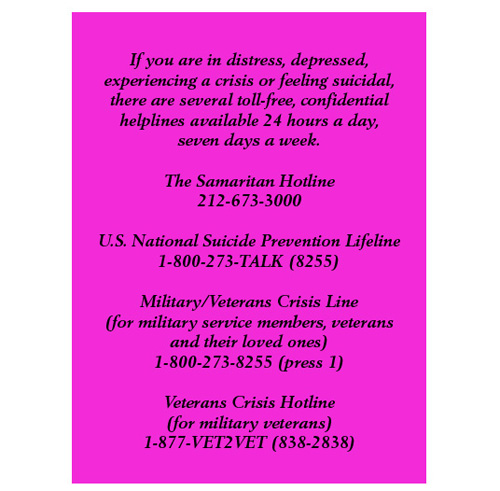by Father William J. Byron, S.J.
Military suicides were at a record high in 2012. They surged to an alarming number of 349, far exceeding the number of combat deaths in Afghanistan. Troubling as that sad statistic is, the military suicide rate is still below that of the civilian population.
It is saddening, of course, to read or hear of anyone’s decision to commit suicide. No one can appreciate the unimaginable pain that is the ultimate explanation for such a tragic action. No one, therefore, can sit in judgment of a person whose choice cannot be fathomed and whose life can only be remembered, but not restored, and whose pain we simply cannot understand.
All we can do is attend to the pain within ourselves as well as the pain that might be there in others around us, military or civilian, especially when no signs are visible and no calls for help are heard.
I often wonder why it is that we seem to be unable to speak to one another about inner pain. Some relatives of those who chose to take their lives report that they may have seen signs of ill health but nothing more.
Encourage Talking It Out
Why are we all not more sensitive to the pain in others’ hearts, or able to read the pain in others’ eyes? As a nation, we spend millions for “pain relief” over the counter or by written prescription, but we don’t spend the time it takes to encourage those who may be hurting to open up and talk it out.
I often wonder if parish support groups might not be able to gently summon those considering suicide out of their isolation and into a circle of understanding and support.
There is some mysterious insulation that those contemplating suicide wrap around themselves. Tragically, toward the end, their minds and hearts can’t be read by those around them, nor do they seem able to reach out and ask for help. And no one, except God, can imagine the unimaginable pain they are experiencing.
Faith assures us that God not only understands but also can forgive and welcome such persons out of their pain into the eternal joy of heaven.
Be More Sensitive
We who remain have to trust in God’s love and mercy and, for our part, do all we can to reach out to others, listen to them and realize that we can be instruments of God’s peace in this world, if we only become more sensitive and alert to the sufferings of those around us. But only God, who is always ready to forgive, can fully understand.
With the recent news that suicides in the military outnumbered combat deaths in Afghanistan last year, outgoing Secretary of Defense Leon Panetta called this an epidemic. That caught the attention of military authorities.
We can only hope that those now in the military will open their eyes, ears and hearts to service members who are bearing in silence the burden of unimaginable pain.
Jesuit Father William J. Byron is a university professor of business and society at St. Joseph’s University, Philadelphia.


Afghanistan’s tragedy exemplifies the maxim of western power – that third world countries are regarded and dealt with strictly in terms of their usefulness to “us”.
The ruthlessness and hypocrisy this requires is imprinted on Afghanistan’s modern history.
One of the most closely guarded secrets of the cold war was America’s and Britain’s collusion with the warlords, the mojahedin, and the critical part they played in stimulating the jihad that produced the Taliban, al-Qaida and September 11.
United States’ actions have nothing to do with fighting terrorism but are instead part of an opened-ended war for global dominance and control of valuable oil resources in the Middle East.
The real danger facing humanity, he says, is the increasingly aggressive military action of American imperialism and the state terrorism orchestrated by the White House.
What are the real aims of this war and who are the most threatening terrorists?
Who is responsible for far greater acts of violence than those committed by the fanatics of Al-Qaeda, crimes that have claimed many more lives than September 11th and always in poor, devastated, faraway places?
This is about the rise and rise of rapacious imperial power and a terrorism that never speaks its name – because it is our terrorism.
Margaret,
I have served in the Horn of Africa, Iraq, Afghanistan, and other places. You could not be further from the truth. I encourage you to visit Somalia or Afghanistan and see terrorism for yourself. Pure evil can be seen and felt; never forgotten.
Depends on your perspective, Joe — certainly the Germans during World War II viewed Allied bombings as terrorist attacks.
After all, Afghan “terrorism” began when Brzezinski encouraged “a few stirred up Muslims’- – meaning the Taliban.
At that time, the late 1970s, the American goal was to overthrow Afghanistan’s first progressive, secular government, which had granted equal rights to women, established health care and literacy programs, and set out to break feudalism.
When the Taliban seized power in 1996, they hanged the former president from a lamppost in Kabul.
Clinton administration officials and oil company executives were entertaining Taliban leaders in Washington and Houston, Texas.
The Wall Street Journal declared: “The Taliban are the players most capable of achieving peace.
Moreover, they were crucial to secure the country as a prime transshipment route for the export of Central Asia’s vast oil, gas, and other natural resources.”
No American newspaper dares suggest it was one of the factors that led to the attacks of September 11.
Somalia, a deeply impoverished country in the Horn of Africa –certainly, there are vast oil fields off the coast of Somalia.